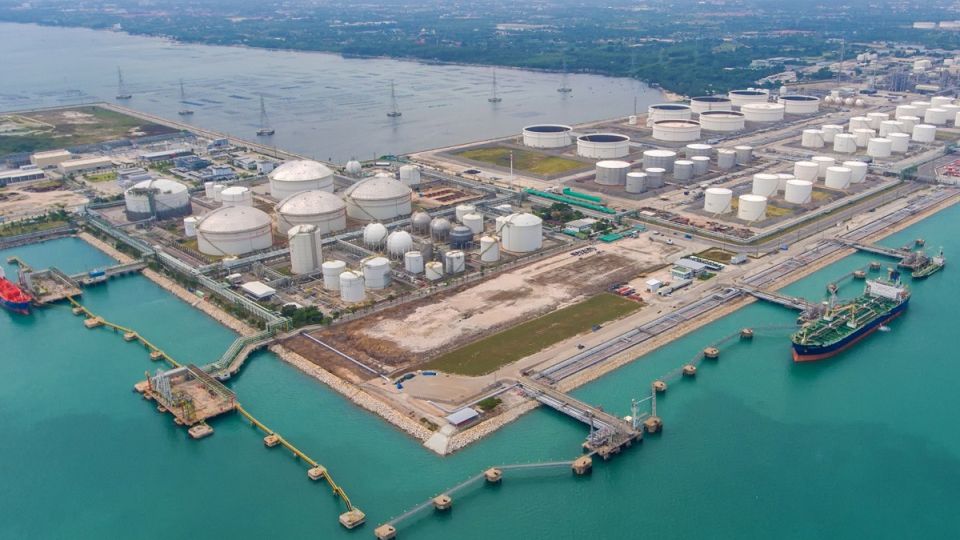
Turkish and Azerbaijani energy companies are considering the joint investment opportunities in neighbouring regions, an official stated on Wednesday, which came a day after President Recep Tayyip Erdogan indicated such a step. He met with his Azerbaijani counterpart, Ilham Aliyev, on Tuesday.
Aliyev also mentioned potential cooperation with the Turkish Petroleum Corporation (TPAO) over the natural gas reserves Turkey has discovered in the Black Sea. His remarks were made during a visit to the symbolic city of Shusha in Nagorno-Karabakh, which was freed from Armenian occupation last November after 28 years.
“We are satisfied with the investments of Azerbaijani companies in Turkey, especially SOCAR. We have talked about the joint investment opportunities of SOCAR and Turkish Petroleum. In the next period, we will continue to boost the size of our commercial and economic collaboration,” Erdoğan said.
“The presidents’ shared opinion on this issue is an instruction for us. SOCAR and TPAO are already co-investing since 1994. We want to continue this, of course. But the country is not yet certain, we will probably have evaluations to do. The third country in question could be somewhere close geographically. Not Singapore or Africa, for example,” said Ilham Aliyev.
SOCAR is one of the biggest foreign investors in Turkey. Its current investments in the country to date amount to approximately $16.5 billion through its subsidiary SOCAR Turkey. That number will increase to around $19.5 billion when all of the Turkish subsidiary’s ongoing projects are completed.
The company began its investment operations in Turkey after buying the country’s leading petrochemical company, Petkim, in 2008 for $2 billion. In addition to Petkim, SOCAR Turkey’s investments include the STAR refinery, the Trans-Anatolian Gas Pipeline (TANAP) project that brings gas from the Caspian Sea through Turkey to Europe, and Petlim, the largest container port on the country’s Aegean coast.
The STAR refinery became fully active in 2019 after being launched in October 2018 with an investment of $6.3 billion. TANAP was implemented with an input of $6.5 billion. Also at the meeting, SOCAR Turkey CEO Zaur Gahramanov said they have the ultimate goal of combining Petkim and the STAR refinery, adding that the project could take several years.
Gahramanov said they were considering the prospect of an IPO after the merger.
Second petrochemical investment
SOCAR is planning an investment in a petrochemical facility in the western province of Izmir, Turkey, and is in negotiations with other companies, including British Petroleum (BP). SOCAR Turkey CEO Zaur Gahramanov had earlier told Anadolu Agency that the investment level for the project could be between $1.6 billion and $2 billion.
However, the investment was postponed to the last quarter of last year, before the project was put on hold. That’s because BP sold its petrochemical business to rival Ineos for $5 billion last June. Aliyev said they were in negotiations with Ineos and other investors. The decision on this investment will be given in 2022, he said.
“We certainly don’t look very favourably on the long-term postponement of our Mercury project, which will be our second petrochemical investment in Turkey. We will make this investment. We can do it with an experienced petrochemical partner or with a financial partner,” he noted.
“The realization of other petrochemical investments on the Turkish agenda does not affect our commitment to the Mercury project.
Potential gas cooperation
Aliyev also referred to Turkey’s latest natural gas discoveries in the Black Sea as strategically interesting.
He said SOCAR and TPAO could cooperate in field development and production activities. joint investment
“In theory, it would be possible for us to work together with Turkish Petroleum Corporation in field development and production activities. Professionally, it is in our area of interest,” Aliyev said.
Turkey’s largest gas field, worth 405 billion cubic meters (bcm), was discovered last year by the Fatih drillship in the Sakarya gas field in the Black Sea. This month, Turkey reported the second discovery of 135 billion cubic meters, bringing the cumulative gas detections to 540 billion cubic meters.
Recently, TPAO reportedly shared data on Black Sea reserves with U.S. energy majors Chevron and Exxon Mobil Corporation for possible collaboration on gas extraction.
Turkey’s new gas discoveries could alleviate its dependence on imports of the commodity, the majority of which is 48 billion cubic meters from Russia, Azerbaijan and Iran via pipelines, not to mention liquefied natural gas from several countries, including Nigeria, Algeria and the United States.
Erdoğan emphasized that his country is determined to become a net exporter.
The country, which currently imports almost all of the gas it consumes, consumes between 45 and 50 billion cubic meters of natural gas each year, at an estimated price of $14 billion. Last year, Turkey imported 48.1 billion cubic meters of gas, 6% more than the previous year, one-third of which came from Russia.
Turkey plans to pump gas from the Black Sea field from 2023, but must first build the offshore pipeline network and processing infrastructure. The field is expected to reach its sustainable peak production by 2027. joint investment
Turkish Energy and Natural Resources Minister Fatih Donmez said it could be between 15 and 20 billion cubic meters, equivalent to one-third of the country’s annual gas consumption.
Hydrogen included in southern gas corridor pipelines
A study to include hydrogen in the Southern Gas Corridor pipeline chain is underway, said Aliyev, who confirmed that a 20% share could be allocated to hydrogen in the pipelines.
The 3,500-kilometer Southern Gas Corridor includes the Shah Deniz 2 field, the South Caucasus Gas Pipeline, the Trans-Anatolian Gas Pipeline (TANAP) and the Trans-Adriatic Gas Pipeline (TAP). The countries involved in the project are Azerbaijan, Georgia, Turkey, Bulgaria, Greece, Albania and Italy.
Inaugurated in 2019, TANAP has a capacity of 16 billion m3, of which 6 billion are delivered to Turkey. Another 10 bcm are delivered to Europe via TAP.
TAP started transporting commercial gas from Azerbaijan to Europe on December 31 last year. It connects to the 878 km long TANAP at the Turkish-Greek border in Kipoi, crosses Greece and Albania as well as the Adriatic Sea, before docking in southern Italy. joint investment
If you would like to read more about Turkish companies you can visit our blog.

